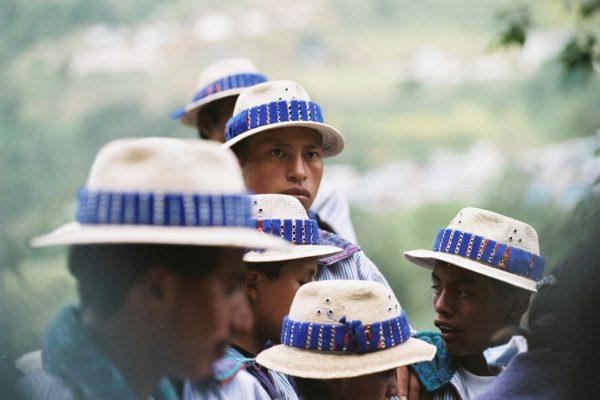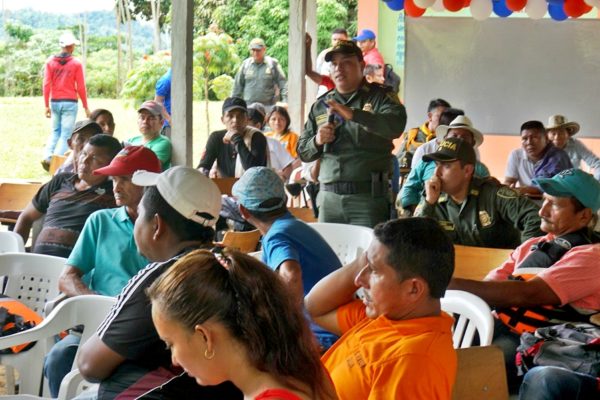“The impunity of the past is today’s corruption” – Lessons learned in Guatemala’s path to build sustainable peace
In 1996 the Peace Agreements were signed in Guatemala, ending an internal armed conflict that lasted 36 years between the government and the guerilla movement. Interpeace’s 25 years of experience has taught us that signing a peace agreement is not the end of the process of building peace, but really the beginning of a long process to transform conflict and build sustainable solutions. Twenty-three years later and Guatemala continues to face widespread violence. Claudia Paz y Paz, Guatemala’s first female Attorney General, from 2010 to 2014, indicates that “impunity is one of the reasons there is so much violence in Guatemala.”
On 17 March 2019, Interpeace co-hosted an event at the Geneva International Film Festival and Forum on Human Rights (FIFDH), entitled “Guatemala: For Memory, Against Impunity” with the World Organizations Against Torture, Casa Allianza, the Geneva Solidarity Delegation and the Right Livelihood Award. The event began with a screening of the documentary Burden of Peace, directed by Joey Boink, which illustrates the work of Claudia Paz y Paz as Attorney General in Guatemala and her fight against impunity, as she seeks to bring justice and truth on the crimes committed during the civil war.
“We cannot ignore the violations of human rights and the only way of dealing with them is through truth and justice.” Throughout the documentary, Claudia Paz y Paz highlights the importance of healing wounds of the past in order to build peace. During her mandate, a genocide trial against General Efraín Ríos Montt took place in Guatemala, convicting him for his role in the massacres of Ixil Mayas in the 1980s. Although the verdict was annulled at the time by the constitutional court, this process marked a changing point in the country. Providing victims with the opportunity to share their experiences during the armed conflict, contributed to a process of restoring trust between the people of Guatemala and the justice system, “there are still open wounds, but maybe we can heal them through justice."
Building trust is essential in the process of building peace. Trust gives institutions lasting legitimacy and helps individuals and groups remain engaged in the process. Claudia Paz y Paz took important steps in this direction. She was one of the most effective attorney generals in the country, but despite her efforts, was forced to leave office seven months early. She mentions, “the impunity of the past is today’s corruption.” Currently the fight against corruption in Guatemala has given hope to the population but has greatly increased political tensions.
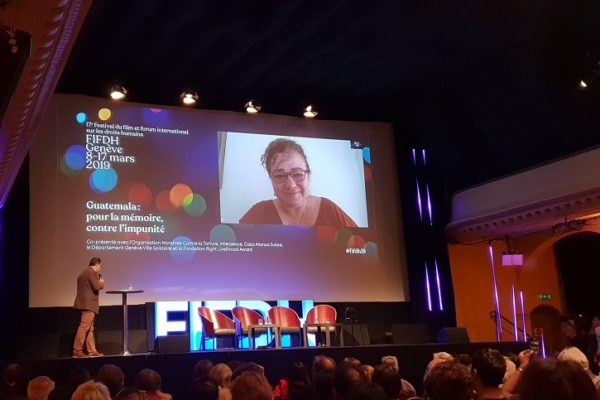
Arnoldo Gálvez interviews Claudia Paz y Paz via Skype at FIFDH event. Photo credit: World Organisation Against Torture
“How do we keep this hope alive?” asked Guatemalan journalist, Arnoldo Gálvez, Global Communications Manager of Interpeace, during an interview with Claudia after the screening of the documentary. “After I left office, Thelma Aldana and Iván Velásquez continued with the fight against impunity. It’s not a one-person job. I have faith in the prosecutors and human rights activists in my country…we cannot let justice take steps back” she answered.
During the panel event, prominent figures in Guatemala’s political landscape discussed the current situation on the eve of the presidential elections on June 2019 and looked back on Guatemala’s fight against impunity and corruption after Claudia left office in 2014.
“Since 2015, when the arrests were made against very high officials in the government, it gave young people hope. Hope that justice could be done and especially that Guatemala’s reality could start to change.” Lenina García, Secretary-General of the Student’s Association of San Carlos University in Guatemala, was one of the panelists at the FIFDH event. She acknowledged the impact produced when President Otto Pérez Molina and Vice-President Roxana Baldetti, were forced to resign and were later convicted on corruption charges. These prosecutions were led by Thelma Aldana, former Attorney General and Iván Velásquez, Head of the International Commission Against Impunity in Guatemala, known as CICIG. Working in conjunction with Guatemala’s Public Prosecutors Office and the National Civilian Police, CICIG is an independent international body that aims to investigate serious crime in Guatemala, to strengthen the rule of law. Established in 2006 by the United Nations in response to a request for assistance from the Government of Guatemala, CICIG has helped dismantle drug cartels, money-laundering rings and death squads.
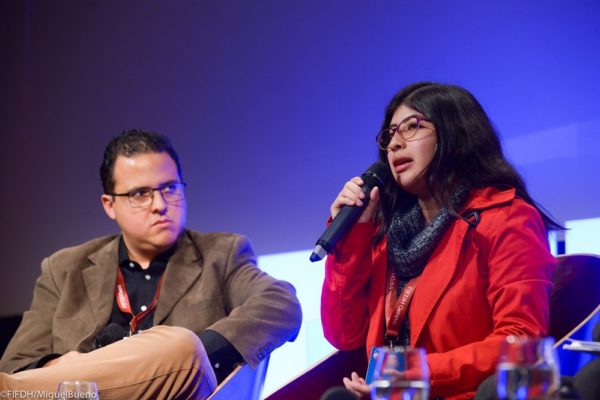
Photo credit: Arnoldo Gálvez and Lenina García. Photo credit: FIFDH/Miguel Bueno
The convictions against former President and Vice-President of Guatemala, began a long process of high-profile arrests made against prominent figures in politics and the private sector, demonstrating a significant change in the justice system in Guatemala. Commissioner Iván Velásquez was also a panelist at the FIFDH event. He recognized the crucial steps made towards building democracy in Guatemala, but also acknowledged that civil society must continue to demand transformative changes, “the indigenous communities and students in Guatemala play a crucial role in the fight against impunity.”
Along with building trust, fostering local ownership is equally important to build sustainable peace. As Iván Velásquez expresses, all sectors of society must participate in identifying the challenges and obstacles to peace and must work together to develop their own solutions. This in turn, will ensure the sustainability of peacebuilding efforts. Those who are traditionally marginalized from politics in Guatemala – women, youth and indigenous groups – therefore, play a key role in bringing change to the country.
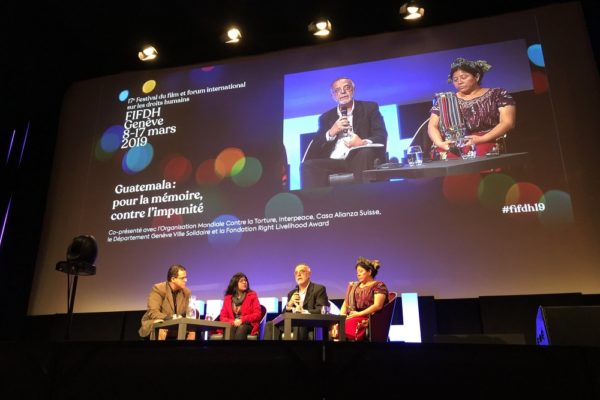
Arnoldo Gálvez, Lenina García, Iván Velásquez and Juana Baca Velasco. Photo credit: FIFDH
Juana Baca Velasco, Director of the Ixiles Association of Women’s Organizations, was the third panelist at the event. “Justice has been managed by the interests of the government. There is very little will to solve the complaints made by the indigenous communities. There are hundreds of violations against indigenous women that have not been brought to justice.” Despite significant efforts in the past 5 years, Juana Baca Velasco reminds us that there is still much to do in Guatemala.
After 25 years of working to build peace in conflict-affected regions in the world, Interpeace recognizes that the process matters and determines the result. There is a need not only to focus on the end goal of building peace, but also on making sure that the process leading to it is managed in a way that allows for inclusion, constructive dialogue and consensus-building – rather than confrontation and power games. Guatemala has taken significant steps towards fighting corruption and impunity, which gives other countries hope that change is possible. Notwithstanding, it is important to recognize that building peace takes time and that long-term commitment is necessary for change to be sustainable.
Watch the livestream of the event held at FIFDH on 17 March, 2019.
Interview via Skype with Guatemala’s first female Attorney General, Claudia Paz y Paz, begins in minute 2:36.
